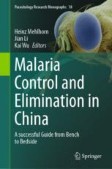Search
Search Results
-
Preliminary evaluation of the protective effects of recombinant AMA1 and IMP1 against Eimeria stiedae infection in rabbits
BackgroundEimeria stiedae parasitizes the bile duct, causing hepatic coccidiosis in rabbits. Coccidiosis control using anticoccidials led to drug...

-
Isolation and light chain shuffling of a Plasmodium falciparum AMA1-specific human monoclonal antibody with growth inhibitory activity
BackgroundPlasmodium falciparum , the parasite causing malaria, affects populations in many endemic countries threatening mainly individuals with low...

-
Eimeria tenella Eimeria-specific protein that interacts with apical membrane antigen 1 (EtAMA1) is involved in host cell invasion
BackgroundAvian coccidiosis is a widespread, economically significant disease of poultry, caused by several Eimeria species. These parasites have...

-
Influenza virus-like particle vaccine containing both apical membrane antigen 1 and microneme-associated antigen proteins of Plasmodium berghei confers protection in mice
BackgroundApical membrane antigen 1 (AMA1) and microneme-associated antigen (MIC) of Plasmodium parasites are important factors involved in host...

-
Comparison of the impact of allelic polymorphisms in PfAMA1 on the induction of T Cell responses in high and low malaria endemic communities in Ghana
BackgroundMalaria eradication requires a combined effort involving all available control tools, and these efforts would be complemented by an...

-
Amplicon deep sequencing of five highly polymorphic markers of Plasmodium falciparum reveals high parasite genetic diversity and moderate population structure in Ethiopia
BackgroundPlasmodium falciparum genetic diversity can add information on transmission intensity and can be used to track control and elimination...

-
Characterization of the primary antibody response to Plasmodium falciparum antigens in infants living in a malaria-endemic area
BackgroundThe primary antibody (Ab) response to Plasmodium falciparum is a critical step in develo** immunity to malaria. Information on the...

-
Identification of adjuvants for clinical trials performed with Plasmodium falciparum AMA1 in rabbits
BackgroundIn this study, seven adjuvants were compared for use with Plasmodium falciparum DiCo-Apical Membrane Antigen 1 ( Pf -DiCo-AMA1), with the...

-
Naturally acquired antibodies from Beninese infants promote Plasmodium falciparum merozoite-phagocytosis by human blood leukocytes: implications for control of asymptomatic malaria infections
BackgroundImmunoglobulin G (IgG) antibodies are thought to play important roles in the protection against Plasmodium falciparum ( P. falciparum )...

-
Vaccination with transgenic Eimeria tenella expressing Eimeria maxima AMA1 and IMP1 confers partial protection against high-level E. maxima challenge in a broiler model of coccidiosis
BackgroundPoultry coccidiosis is a parasitic enteric disease with a highly negative impact on chicken production. In-feed chemoprophylaxis remains...

-
Limited genetic variability of Cytauxzoon felis apical membrane antigen-1 (ama1) from domestic cats and bobcats
BackgroundCytauxzoon felis is a tick-transmitted apicomplexan that causes cytauxzoonosis in domestic cats ( Felis catus ). Even with intensive care,...

-
Application of gold immunochromatographic assay strip combined with digital evaluation for early detection of Toxoplasma gondii infection in multiple species
BackgroundTimely diagnosis of Toxoplasma gondii infection is necessary to prevent and control toxoplasmosis transmission. The gold...

-
Effect of 4 years of seasonal malaria chemoprevention on the acquisition of antibodies to Plasmodium falciparum antigens in Ouelessebougou, Mali
BackgroundMore than 200 million people live in areas of highly seasonal malaria transmission where Seasonal Malaria Chemoprevention (SMC) with...

-
IgG and IgM responses to the Plasmodium falciparum asexual stage antigens reflect respectively protection against malaria during pregnancy and infanthood
BackgroundPlasmodium falciparum malaria is a public health issue mostly seen in tropical countries. Until now, there is no effective malaria vaccine...

-
Genetic diversity and natural selection of Plasmodium vivax reticulocyte invasion genes in Ecuador
BackgroundKnowledge of the diversity of invasion ligands in malaria parasites in endemic regions is essential to understand how natural selection...

-
Evaluating the predictive performance of malaria antibodies and FCGR3B gene polymorphisms on Plasmodium falciparum infection outcome: a prospective cohort study
BackgroundMalaria antigen-specific antibodies and polymorphisms in host receptors involved in antibody functionality have been associated with...

-
Molecular Basis of Malaria Pathogenesis
Blood stage is the most important period for parasite growth, development, and pathogenesis. Studying the transcriptional regulatory mechanism of key...
-
Assessment of precision in growth inhibition assay (GIA) using human anti-PfRH5 antibodies
BackgroundFor blood-stage malaria vaccine development, the in vitro growth inhibition assay (GIA) has been widely used to evaluate functionality of...

-
Malaria therapeutics: are we close enough?
Malaria is a vector-borne parasitic disease caused by the apicomplexan protozoan parasite Plasmodium . Malaria is a significant health problem and the...

-
Heterogeneity in prevalence of subclinical Plasmodium falciparum and Plasmodium vivax infections but no parasite genomic clustering in the Chittagong Hill Tracts, Bangladesh
BackgroundMalaria remains endemic in Bangladesh, with the majority of cases occurring in forested, mountainous region in the Chittagong Hill Tracts...

